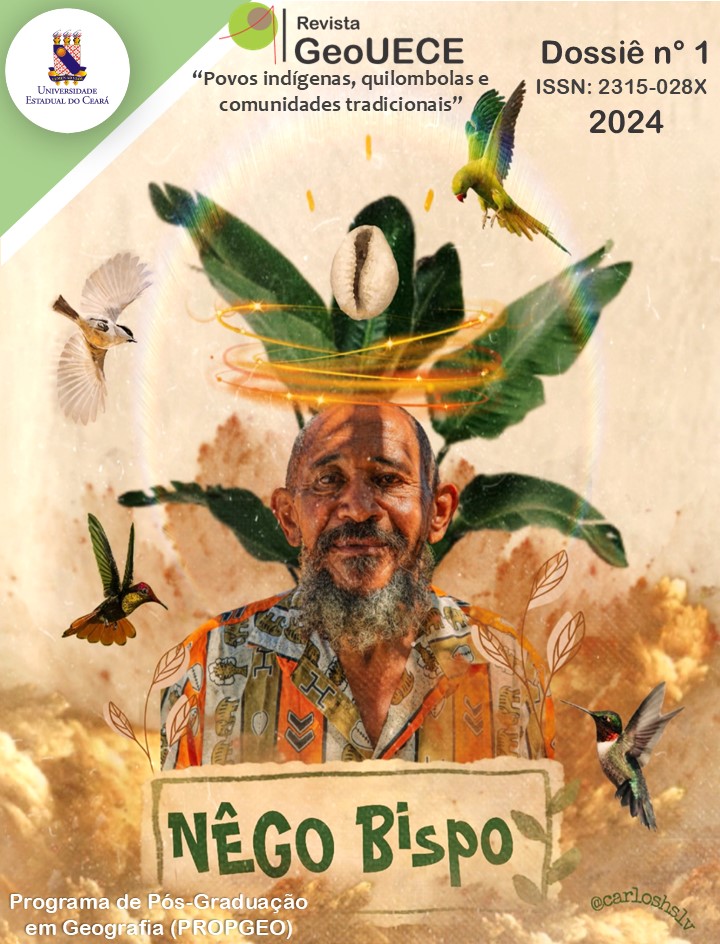Awa Papehapoha: a study on school Education among the Awa Guajá/MA
a study on school Education among the Awa Guajá/MA
DOI:
https://doi.org/10.52521/geouece.v13i25.12217Keywords:
CIMI, Educação Escolar Indígena, Povo AwaAbstract
This article analyzes the process of establishing the school among the Awa Guajá, based on experiences located in communities of this people that included the participation of members of the Indigenous Missionary Council (CIMI). This proposition is broken down into specific objectives: a) analyze the ways in which, in the Awa Guajá cultural context, the school is organized to respond to the interests and intentions of these people and b) discuss the main challenges faced by the Awa Guajá in the construction of a school education based on their own pedagogies and learning processes. The research was carried out in the villages Awa and Tiracambu, T. I. Caru, municipality of Bom Jardim, MA and chose ethnographic research as a theoretical-methodological approach, using two main strategies: the analysis of documentary and bibliographic sources and field research, in which Resources such as observation, recording indigenous testimonies and field diaries are articulated. The results showed that the school was implemented due to a demand and need expressed by the Awa, it was organized with the assumption of a participatory methodology based on dialogue with the culture, language, knowledge of this people, therefore building school practices in the ways of being and educating of the Awa.
Downloads
Metrics
References
BONIN, I. T. Encontro das águas: educação e escola no dinamismo da vida Kambeba – DF.1999. Dissertação (Mestrado em Educação) - Faculdade de Educação, Universidade de Brasília, 1999.
______. Educação Escolar Indígena e Docência: princípios e normas da legislação em vigor. In: BERGAMASCHI, M. A.; DALLA ZEN, M. I. XAVIER, M.L.M.F. (Org.). Povos Indígenas & Educação. Porto Alegre: Mediação, 2012.
BRAND, A. J.A criança Kaiowá e Guarani em contexto de rápidas mudanças: uma abordagem histórica. In: NASCIMENTO, A.C. (Org). Criança indígena: diversidade cultural, educação e representações sociai. Brasília: Liber Livro, 2011.
BRASIL. Constituição da República Federativa do Brasil. Brasília: Senado, 1988.
______. Documento Político Pedagógico da Escola do Povo Awa Guajá para pleito de reconhecimento. São Luís: Cimi-MA, 2013.
______. Relatório das oficinas de elaboração do Projeto Político Pedagógico da Escola Awa. São Luís: Cimi, 2014.
______. Resolução 03/99/CEB/CNE. Brasília: MEC, 1999. Disponível em: http://portal.mec.gov.br/cne/arquivos/pdf/rceb03_99.pdf. Acesso em: 14.12.2023.
______. Projeto Grande Carajás: Trinta anos de desenvolvimento frustrado. Brasília: Tádzio Peters Coelho, 2014. Disponível em: https://www2.ufjf.br/poemas//files/2014/07/Coelho-2014-Projeto-Grande-Caraj%c3%a1s.pdf. Acesso em: 14.12.2023.
______. Lei nº 9394/96. Disponível em: https://www.planalto.gov.br/ccivil_03/leis/l9394.htm. Acesso em 14.12.2023.
FREIRE, P. Pedagogia do oprimido. São Paulo: Paz e Terra, 1987.
______. Educação como prática de liberdade. São Paulo: Paz e Terra, 2011.
FREIRE, A. M. A.; OLIVEIRA, W. F. Pedagogia da Solidariedade. São Paulo: Editora Paz e Terra, 2021.
LACERDA, R. Os povos indígenas e a Constituinte 1987-1988. Brasília: CIMI, 2008.
LORENZ, S. Estudo do Componente Indígena das Terras Indígenas Rio Pindaré e Caru. Processo de Licenciamento Ambiental da Ampliação da Estrada de Ferro Carajás. 2013.
MELIÀ, B. Desafios e tendências na alfabetização em língua indígena. In: MONTSERRAT, R (Org.). A conquista da escrita. São Paulo: Iluminuras, 1989.
______.. Educação indígena na escola. Caderno Cedes, ano XIX, n. 49, Dez/1999. Disponível em:https://www.scielo.br/j/ccedes/a/LP3BV6QHbqSgTdPYXT9YZFG/?format=pdf&lang=pt. Acesso em: 14.12.2023.
OLIVEIRA, A. L. R. de. Projeto Carajás, práticas indigenistas e os povos indígenas no Maranhão. Revista Anthropológicas, ano 8, volume 15, 2004.
SOARES, M. Alfabetização e letramento. São Paulo: Contexto, 2011.
RANGEL, L. H. V. Porque uma escola para os Awa-Guajá. São Luís: CIMI, 2013.
SUESS, P. Pastoral indigenista nos anos 80: resgate histórico-sistemático de desafios, respostas e propostas. Revista de Cultura Teológica, n. 14, 1996, p. 117-139. DOI: https://doi.org/10.19176/rct.v0i14.14262
SANTOS, R. de J. D.; BORGES, M. M. O uso da Língua Guajá escrita nas demandas sociais do povo. In: IV Congresso Internacional de Estudos Linguísticos e Literários da Amazônia. Belém: UFPA, 2013.
SANTOS, L. G. J. dos. Língua, educação e interculturalidade na perspectiva indígena. Revista de Educação Pública, Cuiabá v. 26 n. 62, v.1 p. 295-310, maio/ago, 2017.
SILVA, R. H. D. da. A Autonomia como valor e a articulação de possibilidades: um Estudo do Movimento dos Professores Indígenas do Amazonas, Roraima e Acre – SP. 2009. Tese (Doutorado em Educação) – Faculdade de Educação, Universidade de São Paulo, 1999. DOI: https://doi.org/10.1590/S0101-32621999000200006
WALSH, C. Interculturalidad y Educación Intercultural. Seminario “Interculturalidad y Educación Intercultural. La Paz: Instituto Internacional de Integración del Convenio Andrés Bello, 2009.
UBBIALI, C. Projeto de Alfabetização dos Índios Guajá: documento digitado. São Luis: CIMI-MA, 1999.
______. Índios Guajajara e o Programa Grande Carajás: cinco anos do projeto “Apoio às Comunidades Indígenas do Maranhão”. São Luís: CIMI, 1990.
Downloads
Published
How to Cite
Issue
Section
License
Copyright (c) 2024 Rosana de Jesus Diniz Santos, IARA TATIANA BONIN, MARILDA DA CONCEIÇÃO MARTINS

This work is licensed under a Creative Commons Attribution-NonCommercial-NoDerivatives 4.0 International License.

































